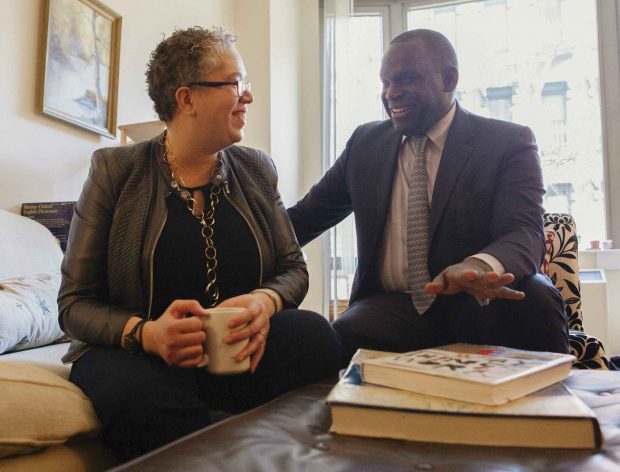MARRIED NOW FOR more than a decade, John and Gabi might never have met if it hadn’t been for The Secret Life of Aphra Behn, the story of the 1600s English playwright, poet and sometime spy.
A colleague of Gabi’s who knew John from high school set them up on a blind date. John found a well-reviewed Brazilian restaurant in Greenwich Village, set the date and time, and then promptly forgot the restaurant’s location, getting lost in the process. Ever the scholar and never without a book, Gabi opened Behn’s biography and lost track of time. Eventually, a harried and apologetic John showed up a solid 45 minutes late.
How did he know how to find Gabi in a crowded Village hot spot? In John’s telling: “Scan the room for women approximating your friend’s vague description; then approach the woman reading the biggest book, and voilà!”
Unlike Gabi, John is not a scholar of the 18th century (or to be more precise, the period from 1660 to 1830 that historians term the “long 18th century”). That said, he remains ever grateful for the compelling life story of Behn.
When it comes to books, though, John and Gabi aren’t always on the same page. While she often leans toward fantasy, he is drawn toward nonfiction on the heavier side.
A few years back, John was up late at night reading Master of the Senate, one of historian Robert Caro’s acclaimed Lyndon Johnson biographies, when he reached the section detailing how U.S. Senator Richard B. Russell Jr. of Georgia, leader of the Southern Caucus, led a cabal that had successfully blocked civil rights legislation for years.
Infuriated, John hurled the hardcover book (all 1,200-plus pages) into a wall with enough force to startle Starr, who was contentedly reading in the next room. In her Feeling Beauty: The Neuroscience of Aesthetic Experience, Gabi obliquely cites this incident as an example of sometimes intense aesthetic responses.
John and Gabi both add a post-script to this story. This past spring they met Robert Caro and his wife at a dinner in New York. Recounting the flung tome story, Caro assured them that this reaction may have been the “best compliment he has ever received,” since writing about the anti-civil rights cabal was so troubling: “How can you do anything but throw the book?”
For Gabi and John, their varied reading lists only add to the conversation. “John is one of the smartest—and wittiest— people I know,” says Gabi. “He won me over completely with a passionate argument about the Mining Act of 1872. I’ve never looked back. He cares very deeply about the world around us, about politics and policy, about justice and also about beauty and friendship.”
The couple has two school-age children—their daughter, Georgianna, and son, Elijah.
A native of Wisconsin, John C. Harpole graduated from Dartmouth College, where he majored in government and undertook additional coursework in moral philosophy. Speaking of his ongoing interests in civics, foreign policy and history, John notes, “Divorcing policy from morality and ethics is a very dangerous game.”
After college, John simultaneously passed the Foreign Service exams and secured a position as a securities analyst at the State of Wisconsin Investment Board. When his clearances came through, John joined the U.S. State Department. He served in D.C. and later abroad as a vice consul and as a staff aide to the U.S. ambassador to Colombia in Bogotá.
Returning from service abroad, John entered the M.B.A. program at the Tuck School of Business. For John, Tuck was transformative: “The school took a liberal arts approach to quantitative disciplines. For me, it opened a new world of rigorous, analytical inquiry for which I am deeply grateful.”
Upon graduation, John moved to New York and re-engaged his investment career at J.P. Morgan. Later he opened his own alternative asset advisory firm, which he ran for nearly a decade. Today John applies his skills and experiences in the leadership advisory and financial services practices at a global talent consultancy. When asked to reflect upon his career arc, John recalls his liberal arts experience and training: “In life as in careers, there is no straight line from A to B; success can be found by applied curiosity and the willingness to engage change.”
This commitment to curiosity and inquiry is something he and Gabi share: “For me,” says John, “I think of it as intellectual recursiveness—a constant, never-ending reassessment of assumptions and biases in the search for better answers. When we’re fearful, unquestioning or just plain complacent, that’s when we make bad decisions.”
John adds, “I am sure that Pomona, as well as the 5Cs and the wider Claremont community, will find in Gabi a leader who finds in each person a reason to engage. To her, the fact that someone has point of view X or ideology Y is not a barrier to engagement but an opportunity, ultimately, to facilitate understanding.”

